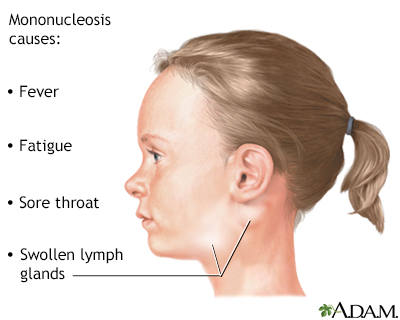Mononucleosis

What is Mononucleosis?
Mononucleosis, often referred to as "mono" or the "kissing disease," is a common infectious illness caused by the Epstein-Barr virus (EBV). It typically affects teenagers and young adults and is characterized by symptoms such as fever, sore throat, swollen lymph nodes, and fatigue.
Who's at risk for Mononucleosis?
While people of all ages can contract mononucleosis, it most commonly affects adolescents and young adults between the ages of 15 and 24. Those with weakened immune systems are also at a higher risk of developing more severe cases of the illness.
What causes Mononucleosis?
Mononucleosis is caused by the Epstein-Barr virus, a member of the herpes virus family. The virus is transmitted through close personal contact, such as kissing or sharing utensils, as well as through respiratory droplets from an infected person's cough or sneeze.
How does Mononucleosis start?
Mononucleosis starts when the Epstein-Barr virus enters the body and infects the immune system's B cells. The virus then replicates within these cells, leading to the production of more virus particles and causing the immune system to mount a response, which results in the characteristic symptoms of the illness.
What are the symptoms of Mononucleosis?
The symptoms of mononucleosis include:
- Fever
- Sore throat
- Swollen lymph nodes, particularly in the neck
- Fatigue and weakness
- Muscle aches
- Headache
- Enlarged spleen or liver
- Skin rash
How is Mononucleosis diagnosed?
Mononucleosis is typically diagnosed through a combination of clinical symptoms, medical history, and laboratory tests. Tests may include:
- A complete blood count (CBC) to check for an increased number of white blood cells or abnormal lymphocytes
- A monospot test or an Epstein-Barr virus antibody test to detect the presence of antibodies against the virus
How can Mononucleosis be treated?
There is no specific treatment for mononucleosis, as it is a viral infection. Treatment focuses on relieving symptoms and providing supportive care, such as:
- Getting plenty of rest
- Staying well-hydrated
- Taking over-the-counter pain relievers and fever reducers, such as acetaminophen or ibuprofen
- Gargling with salt water to soothe a sore throat
What complications may occur with Mononucleosis?
While most cases of mononucleosis are mild, complications can occur, including:
- Enlarged spleen, which can rupture in rare cases
- Hepatitis or jaundice due to liver inflammation
- Anemia or low platelet count
- Neurological complications, such as meningitis or encephalitis
How can I prevent Mononucleosis?
Preventing mononucleosis involves reducing the risk of exposure to the Epstein-Barr virus by practicing good hygiene, such as:
- Avoiding close personal contact, like kissing, with someone who has mono
- Not sharing utensils, toothbrushes, or drinking glasses with an infected person
- Washing your hands frequently
Long-term management of Mononucleosis
Long-term management of mononucleosis involves getting plenty of rest and allowing the immune system to recover. Most people fully recover from mono within a few weeks to a few months. However, some individuals may continue to experience fatigue for several months after the infection has resolved.
What is recent research saying about Mononucleosis?
Recent research on mononucleosis focuses on understanding the Epstein-Barr virus's behavior and its interactions with the immune system, as well as exploring potential antiviral treatments and preventative measures, such as the development of a vaccine. Studies are also investigating the long-term effects of mononucleosis, including the possible link between EBV infection and an increased risk of developing certain autoimmune disorders or cancers.
Where can I go for more information on Mononucleosis?
For more information on mononucleosis, consult your healthcare provider or visit reputable health organizations' websites, such as the Centers for Disease Control and Prevention (CDC), the Mayo Clinic, or the American Academy of Pediatrics. These organizations provide comprehensive information on mononucleosis, including diagnosis, treatment, prevention strategies, and ongoing research.

